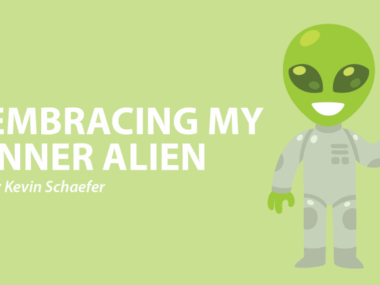How my fellow disability advocates in Singapore taught me confidence
Overcoming impostor syndrome at my first public speaking gig
Written by |

For months, I waited in anticipation of July 22. I was going to be on a promotional panel for “Not Without Us: Perspectives on Disability and Inclusion in Singapore,” a book I contributed a chapter to last year.
Before I’d even signed the contract, friends and family asked me for the date of the event so they could attend. In the lead-up, the roster of people speaking with me changed twice. I changed my mind about which dress to buy at least a dozen times. I bought my makeup in May. I rehearsed my introduction and what I wanted to say for weeks. And then, at long last, it was the big day.
I arrived early at the library where the event was taking place— my dad and caregiver in tow — in a blue dress inspired by “The Little Mermaid.” The coworking space temporarily taken over by the publisher of “Not Without Us,” Ethos Books, was mostly empty still. The staff of Ethos was there, friendly faces I was happy to see, along with one of my fellow panelists, choreographer and filmmaker Ammar “Ameezy.”
It was my first time doing a public speaking gig. As we traded greetings and made small talk, I was so nervous that my heart was practically hammering against my chest and I was sweating. I’d never even done a school presentation before, having been home-schooled.
The last time I was onstage was at a camp for kids with neuromuscular diseases over a decade ago, and our play was all fun and games. It was nothing like speaking professionally. I found it incredibly ironic that the panel’s theme was “inclusion at work.” Sure, I’m an established journalist, professional disability advocate, and published author, and I know what workplace inclusion looks like (and doesn’t look like) from working with multiple editors, but my lack of formal education and academic accreditation made me feel like I’d tricked my way into being a speaker.
“What am I doing here?” I wondered to myself. A million other questions followed.
Could I remember the questions and answers we’d discussed in our group’s email thread? Would people be able to hear me all right, what with SMA impairing my volume and pronunciation? Would I accidentally go off topic or lose my train of thought? Did I look OK for photos? What if I needed my caregiver to adjust my posture and people found that unsightly and distracting? Was I going to make a fool of myself?
I had no idea how to stop the hurricane in my head that was my impostor syndrome. Thank God for perfume and air conditioning, or I would’ve been anxious about how I smelled on top of everything else.
On the other hand, Ethos’ staff and Ameezy appeared perfectly calm, practiced, and confident — as did rapper and wheelchair rugby player Danial Bawthan and the founder of Singapore’s first disability-led theater company, Grace Lee-Khoo, when they joined us to complete the panel’s roster.
It turns out, I had very little to worry about.
The impostor mask is off!
The day didn’t go off without a hitch. The microphones gave us some trouble, with mine in particular practically refusing to balance on its stand when we were setting up. Some of the people who wanted to attend couldn’t come or were late. We had so much to discuss that the panel went off script and nearly exceeded its advertised time limit. I dissociated at times because of my nervousness. But nothing went terribly wrong, and I came out fine.
My survival was largely thanks to the other panelists, whom I learned so much from in our few hours together. Grace was charismatic and adept at moderating the discussion, and ensured I was included in private conversations with the other panelists, even though they knew one another and I’d only just been introduced. Ameezy, despite his admission just before the panel began that he was afraid he’d go on long tangents, never once did and thoroughly entertained the audience with his humor. Danial immediately made me feel like we’d been friends for years and didn’t have the hang-ups I did about visibly asking for help, which effectively put me at ease as the panel went on.
At the end of the event, one of Ethos’ staff members talked with me about future public speaking opportunities. Then an audience member thanked me for sharing my story. I managed to engage in conversation with friends casually. Writing about the experience now, after giving myself time to digest it fully, I feel silly for allowing my fears a voice in my head.
So, reader, if you’re fighting off impostor syndrome in anticipation of a big day like I was, I hope this column helps you like my fellow panelists helped me. You’ve got this!
@sherlisass Had a fantastic time promoting Not Without Us: Perspectives on Disability and Inclusion in Singapore, along with inclusion in the workplace, @ Punggol with my fellow panelists Danial Bawthan and Ammar Nasrulhaq, and our moderator Grace Lee-Khoo. It was my first time on a panel, and I’m so grateful to each of you for helping me feel comfortable and confident in my disability on the day of. Photo and footage cred: Ethos Books and my dad (who cannot use portrait mode to save his life). #disabilitytiktok #disabilitytok #sgtiktok #sgtok #disabilityfyp #sgfyp
Note: SMA News Today is strictly a news and information website about the disease. It does not provide medical advice, diagnosis, or treatment. This content is not intended to be a substitute for professional medical advice, diagnosis, or treatment. Always seek the advice of your physician or other qualified health provider with any questions you may have regarding a medical condition. Never disregard professional medical advice or delay in seeking it because of something you have read on this website. The opinions expressed in this column are not those of SMA News Today or its parent company, Bionews, and are intended to spark discussion about issues pertaining to spinal muscular atrophy.








Leave a comment
Fill in the required fields to post. Your email address will not be published.